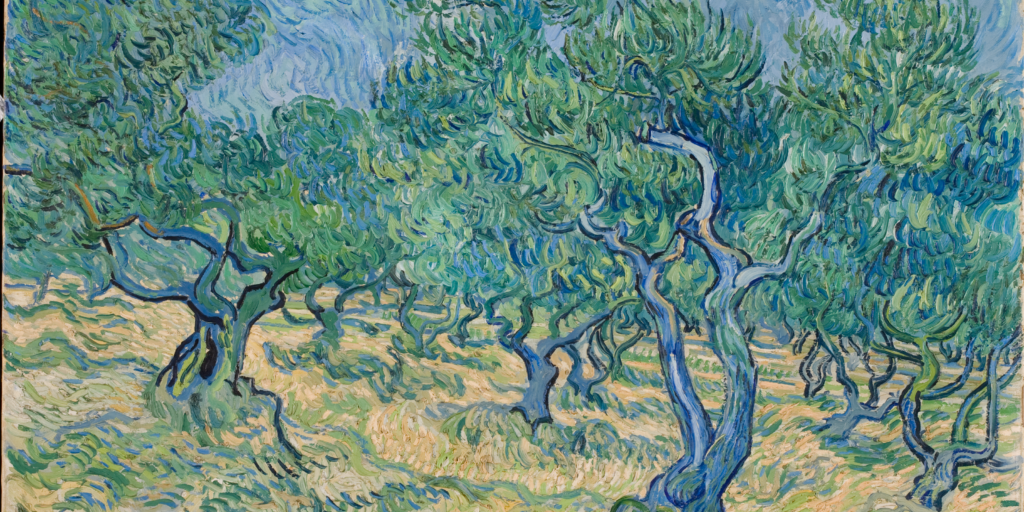
Gethsemane
Then Jesus went with them to a place called Gethsemane, and he said to his disciples, “Sit here, while I go over there and pray.” And taking with him Peter and the two sons of Zebedee, he began to be sorrowful and troubled. Then he said to them, “My soul is very sorrowful, even to death; remain here, and watch with me.” And going a little farther he fell on his face and prayed, saying, “My Father, if it be possible, let this cup pass from me; nevertheless, not as I will, but as you will.” And he came to the disciples and found them sleeping. And he said to Peter, “So, could you not watch with me one hour? Watch and pray that you may not enter into temptation. The spirit indeed is willing, but the flesh is weak.” Again, for the second time, he went away and prayed, “My Father, if this cannot pass unless I drink it, your will be done.” (Matthew 26:36–42)
Standing here in this garden, we rightly feel a sense of gravity and solemnity. Here, our Lord determined to drink the cup of God’s wrath down to the dregs for us. We cannot even begin to describe the anxious inner-turmoil he went through on our behalf. It is right for us to feel proper awe and gratitude and humility for such moment in the life of Christ. But, we must be sure to locate the mystery of this sacred moment in the right place, lest we ascribe to Christ conclusions that are altogether unfitting. We desperately want to worship him, and in doing so, we want to worship him truly and rightly. So, let us consider this moment in light of those realities of Christ’s two natures.In the incarnation, Christ becomes truly man, which means all the difficulty and suffering that man is subject to as man, Christ experienced and endured. Click To Tweet
When we think about this passage, it is easy to fall into errors. On the one hand, we might fail to adequately account for Christ’s sinlessness and his true divine nature, and thereby project our inner emotional turmoil up into the heart of God himself. From this kind of passage, we might come to believe, even unwittingly, that the Trinity is a composite of distinct and separate wills, with two of them in conflict with one another (i.e., with the Son’s will reluctant to bow to the Father’s). But we have to remember two important points when we consider this gospel scene. First, the divine will of the Trinity is one and undivided. There are not multiple wills in the single Godhead because there are not multiple beings therein. Whatever is happening here in the garden, it is not an eternal will of the Son conceding to a separate eternal will of the Father. Second, we have to remember that Christ is our sinless priest, who was tempted in every way as we are but with the all important exception that he remained without sin. Which means, while Jesus felt a genuine turmoil and emotional anxiety about what he would have to endure, he did so without ever desiring to do the opposite (since the opposite of obedience would be the sin of disobedience, and a desire to sin is itself sin). This is difficult for us to understand, as sinful and fallen creatures, because the kind of inner turmoil we experience in the face of hard obedience is always concurrent with a sinful desire to disobey. But Jesus was our spotless Lamb, unstained by sin in every way.
We might also be tempted to exaggerate in the other direction, and conclude that Jesus’s turmoil and anxiety here in the garden was almost a show—as if he were acting. But we must not imagine, like the Apollinarian heretics of the fourth century, that Christ did not have a truly human emotional life–a human center of will and consciousness. In the incarnation, Christ becomes truly man, which means all the difficulty and suffering that man is subject to as man, Christ experienced and endured. What we witness in the Scriptures in this episode is true struggle—a real man pushing his human nature to the breaking point in a genuine act of selfless obedience to God.
If we are to avoid minimizing Christ’s divine nature or on the one hand, or minimizing his human nature on the other, how should understand what is happening here in the garden? The answer is found in that glorious line repeated in the creeds: “for us men and for our salvation.” We needed the suffering of man, and thus, he assumed a nature of a man—a nature capable of suffering. Click To TweetThink about the desperation of our situation, brothers and sisters. Starting with Adam, and continuing on through the patriarchs and Israel as a whole, and even with the great King David himself: every federal head, every representative we ever had before Christ, was subject to the same sinful condition as all mankind, and was therefore utterly incapable of acting righteously on our behalf. Adam, and every Adam after him, failed. All of us, and all of our federal heads, were disobedient. We needed the obedience of a federal head who could obey where Adam and every Adam after him, disobeyed—who could succeed where Adam, and every Adam after him, failed.
And Christ Jesus is that Second Adam. He is that Federal Head. We needed the obedience of a man, and thus, he assumed the nature of a man—a nature capable of obedience. We needed the suffering of man, and thus, he assumed a nature of a man—a nature capable of suffering. This is why we should not imagine that the Trinity is comprised of three wills, with one (the Son’s) eternally in subjection to another (the Father’s); that would be no good news for us. Were that the case, the Son’s obedience in this garden would be for his own sake, not for ours! Further, we should not imagine that the Son is only pretending to suffer in his obedience; that would be no good for us either—we don’t need the obedience of a super-man, who doesn’t truly suffer, since such an obedience could only be imputed to other super-men. No, we need the obedience of frail and fragile man, because we are frail and fragile man. Marvel, then, at what we have in the person of Christ. The only one who actually deserved to have the cup pass by him refuses to demand it so that we, we deserve to drink that cup to its dregs, could watch it pass by us.
The above is a devotional homily I gave to a group of seminary students in the Garden of Gethsemane in Israel, November 2022.

